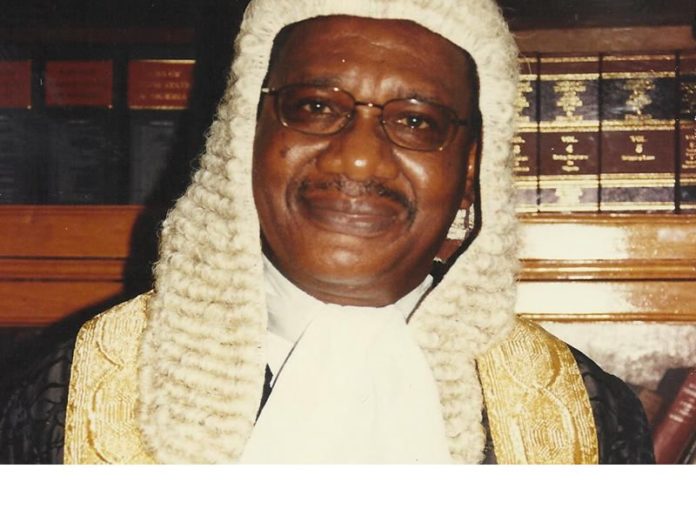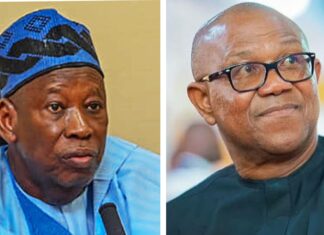Chairman Presidential Advisory Committee Against Corruption Professor Itse Sagay has advocated “stiff punishment for counsel, particularly Senior Advocates, who he accused of turning obstruction and frustration of proceedings on high-profile corruption cases into an art.”
Sagay, himself a Senior Advocate of Nigeria (SAN), said such punishment for SANs must include denial of right of appearance in such high profile and grand corruption cases.
Sagay said this on Wednesday at the Socio-Economic Rights and Accountability Project (SERAP)’s latest media roundtable titled: Strategies and Approaches for the Successful Completion and Effective Prosecution of Abandoned and Unresolved High Profile Cases of Corruption in Nigeria. Combating Grand Corruption and Impunity in Nigeria. The roundtable, which held in Ikeja Lagos, was organized in collaboration with TrustAfrica.
The Attorney General and Commissioner for Justice of Ogun State Mr. Olumide Ayeni who chaired the event said, “Any person who loves this society will welcome and attend events of this nature. It is a very important subject we are here to discuss, to find ways of addressing the cankerworm that has evaded our society.”
Mr Okoi Obolo- Obla, Special Assistant on Prosecution to President Muhammadu Buhari who represented the Attorney General of the Federation and Minister of Justice Abubakar Malami SAN said, “I admire what SERAP is doing. It is not Buhari’s work to fight corruption alone, it is all our fight. It is corruption that is fuelling this agitation by the different groups.”
Mr. G.K Latona Head of Legal, of the Economic and Financial Crimes Commission (EFCC) who represented EFCC Chairman Ibrahim Magu said, “We are not working at cross purposes with the Office of the Attorney General of the Federation; we are cooperating with them. We have a wide range of corruption cases in concert with state agencies. The Attorney General’s office has the right to initiate new high-profile corruption cases and investigate them themselves without waiting for cases initiated by the EFCC. We are also working on best practices manuals for the prosecutors and investigators If you want a corrupt free society, we must all work towards it.”
Mr. Abubakar Balarabe Mahmoud (SAN), President Nigerian Bar Association, said “Lawyers should report to NBA anything they observe in court that is corrupt.”
In his paper, Sagay also urged prosecuting counsel in grand corruption cases “to apply to reinstate any case struck out for want of prosecution. In cases requiring appeal, the authorities must apply for leave to appeal out of time, and prepare evidence and legal arguments thoroughly, including by inviting consultants to advise.”
According to Sagay, prosecuting authorities must “Insist on full application of Sections 306 and 396 of the Administration of Criminal Justice Act, namely: No stay of proceedings under any circumstances – S. 306.Any preliminary objection must be taken together with the substantive issue – S. 396(2), and hearings shall be on a daily basis, but in exceptional cases, adjournments not to be in excess of 14 working days, may be granted. Such adjournments not to exceed 5 in any proceedings – S. 396 (3) and (4).”
Sagay also recommended that, “A High Court Judge who is elevated whilst presiding over a criminal case, should be allowed to conclude the case without any effect on his new status. The Head of various Courts, namely Chief Justice of Nigeria; President, Court of Appeal; Chief Judge of the Federal High Court; and Chief Judges of State High Courts, should be sensitized about the very critical nature of the fight against high-level official corruption to Nigeria’s development and the welfare of its peoples.”
Sagay’s other recommendations read in part: “Pending the establishment of a Special Crimes Court for the whole country, Criminal Divisions should be created in the Federal and State High Courts. Specially vetted and selected Judges, known for integrity and self-discipline should be posted to man such Courts.”
“It is very important to deploy the Administration of Criminal Justice Monitoring Committee and Civil Society Groups to monitor all high profile corruption cases on a day to day basis (i) to ensure that corruption cases are heard speedily and in full compliance with Sections 306 and 396 of the ACJA, (ii) to report non-compliance by any Judge to the National Judicial Council (NJC).”
“All suspected proceeds of crime should be placed under temporary forfeiture during the trial of a high-profile person. Prosecuting authorities should resort to Non-Conviction Based Asset forfeiture, where proof beyond reasonable doubt is difficult to achieve because of technicalities. Prosecuting authorities should also consider resorting frequently to the Plea Bargaining Provisions of ACJA in order to save time and state resources.”
Barrister Babatunde Ogala on his part said that “The moment you take public office, the expectations of you are very high. Corruption is a problem in all of us, our values encourage corruption, pressure from family and well-wishers, once you attain political office. Government is fighting corruption to the best of its ability.”
The Guest Speaker Professor Yemi Akinseye-George SAN said that, “The best way to rob a country is to buy its political system. There are several high profile corruption cases that are stuck and unresolved- no acquittal, no conviction. The National Judicial Council should be proactive in tackling corruption. Judiciary must purge theme selves of corruption so that they can avoid executive interference We also need to leverage on e- recording of proceedings and put an end to writing in long hand by judges.”
According to Professor Akinseye-George, “There is need for authentic and reliable source of information on corruption cases. Civil Society Organization should be apolitical, they should focus on the issue and not the persons. SERAP is at the forefront of the campaign for the efficient prosecution of high corruption cases. Please sustain the advocacy. Civil Societies like SERAP can help build independent data basis which can be updated regularly. This will help a lot. Questions like who and who have been plea bargained, what are the conditions, the agreements, etc can then be answered.”
Others represented at the event included the Independent Corrupt Practices and Other Related Offences Commission (ICPC); the Nigerian Labour Congress, the National Human Rights Commission; Nigerian Institute of Advanced Legal Studies, the US embassy, the Royal Netherlands embassy, members of the civil society and the media.













